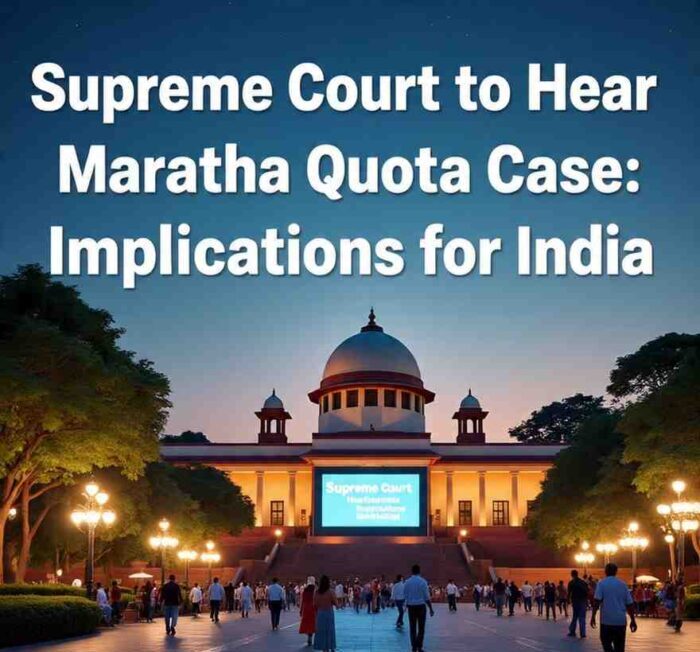In July 2025, the Supreme Court is set to take another close look at the contentious Maratha reservation case. Understand the significance of this case for Maharashtra, India’s reservation policies, and future affirmative action measures.
Introduction:
The Maratha reservation issue has resurfaced in the national spotlight as the Supreme Court of India is set to hear a pivotal case in July 2025. This case challenges the legality of reservations granted to the Maratha community in Maharashtra for education and government employment.
The outcome of this case could have far-reaching effects, impacting not only the Maratha community but also the overall framework of India’s reservation system. This article simplifies the background, key legal debates, and what to expect from this important judicial review.
Background of the Maratha Reservation
The Maratha community, known for its political influence and economic prominence in Maharashtra, has long sought reservation benefits, citing social and educational disadvantages.
The 2018 law by the Maharashtra government extended a 16% reservation to Marathas under the newly designated Socially and Educationally Backward Class (SEBC) category. This raised the state’s overall reservation quota to over 70%, notably surpassing the 50% ceiling set earlier by the Supreme Court.
This development sparked numerous legal challenges, ultimately leading the case to be heard by the Supreme Court.
The Supreme Court’s Verdict in 2021
The Maratha reservation law was invalidated in May 2021 by a five-judge Constitution Bench, which held that:
- The Maratha community does not qualify as socially and educationally backward enough to merit special reservation.
- The total reservation exceeding the 50% ceiling without exceptional reasons is unconstitutional.
- Only the President of India, on advice from the National Commission for Backward Classes (NCBC), has the authority to identify backward classes, not state governments independently.
- This landmark ruling not only affected the Maratha quota but also curtailed the powers of state governments in determining reservation policies.
Why the Case is Back in 2025
Despite the 2021 Supreme Court verdict, the Maharashtra government enacted a fresh law in early 2024, proposing a 10% reservation for the Maratha community in education and public employment. This new provision is framed as a temporary measure and follows a distinct structure from the earlier policy.
However, this new legislation is again being challenged, with opponents claiming that:
- It violates the Supreme Court’s previous decision.
- It still breaches the constitutional 50% reservation limit.
- It exploits legal loopholes to reintroduce caste-based quotas.
- A hearing on the newly filed petitions is slated to be held by the Supreme Court in July 2025.
Key Legal Questions for the Supreme Court
As the Court examines the new law, several important constitutional questions arise:
- Can a state bypass the earlier rejection by modifying the reservation scheme?
- Is the Maratha community still considered not backward? The government may submit new evidence to support the reservation.
- Does the Constitution permit breaching the 50% reservation threshold if extraordinary conditions are established?
- Who has the ultimate authority to designate backward classes: the state government or the Central government? This ties into interpretations of the 102nd Constitutional Amendment.
Why This Case is Crucial for India
This case is more than just about one community or one state. Its implications include:
- Potentially reshaping India’s reservation framework. If the Court allows Maharashtra to breach the 50% limit, other states may follow suit, triggering numerous quota demands.
- Affecting millions of students and job seekers since reservation policies directly influence admissions and government employment.
- Defining the power balance between state governments and the central government regarding social justice policies.
- Reigniting debates on meritocracy versus caste-based reservations, with critics warning about merit dilution and supporters emphasizing social equity.
What to Expect Next
The hearing is slated to start in mid-July 2025 and may last several weeks, depending on the arguments presented.
If the Court upholds the new law, it will be a significant win for Maharashtra and the Maratha community. Conversely, if the law is struck down, the state may have to reconsider its approach or seek a constitutional amendment.
Conclusion
The upcoming Supreme Court hearing on the Maratha reservation is one of the most significant legal events of 2025. It will influence not only the Maratha community but also the broader future of India’s reservation system, state autonomy, and constitutional equality.
Whether you are a student, policymaker, or an engaged citizen, this case deserves close attention as it could define the trajectory of social justice in India for years ahead.

























